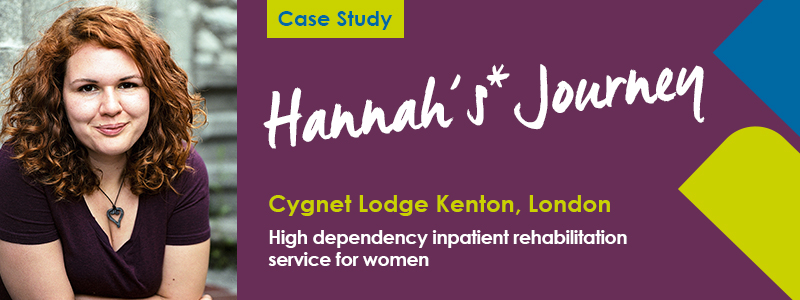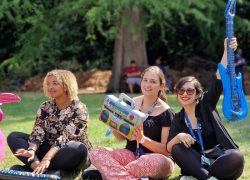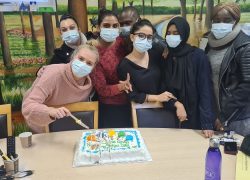
Hannah’s* history
Hannah was referred to us after 15 years of requiring psychiatric support. She had a longstanding diagnosis of Schizoaffective Disorder / Emotionally Unstable Personality Disorder, and was just coming to the end of six years of worsening mental health following her daughter being taken into care. Hannah’s own childhood had been difficult, losing both parents at a young age. However, she had been able to keep a close relationship with her siblings.
Hannah experienced particularly intense hallucinations and delusions about the people around her, she was morbidly obese, had poor self-care, and was difficult to understand as she mumbled and slurred her speech. Hannah was deluded, distressed and prone to calling the emergency services and assaulting staff and police when she didn’t immediately get her way.
When Hannah came to us
It was clear that in her previous placement Hannah had been over-medicated and was in a service that suffered from a lack of therapeutic optimism.
She had sunk into a chronic level of institutionalisation that left her wanting everything to be done for her. She hid her medication, which she was adamant she didn’t need. She hyper-salivated and had a range of physical health problems.
One of the strengths of the staff team at Cygnet Lodge Kenton is the thought they put into the care they deliver to ensure it’s genuinely personalised.
The team have a striking ability to find ways to empower the women they work with.
Hannah’s care
One of the first changes we made in Hannah’s treatment regime was to review her medication and agree a gradual programme of reduction, first of the anti-psychotics, with a view to reconsidering the need for mood stabilisers at a later date. Although the plan wasn’t completely to her liking, Hannah appeared to recognise that Cygnet Lodge Kenton was a place she would be listened to and her views taken seriously.
As a result her communication became significantly clearer, and at the same time she became both considerably less violent and more argumentative. Nevertheless, with gentle persistence from the multi-disciplinary team (MDT) and, in particular, the support workers assigned to her care, Hannah was encouraged to start walking outside the hospital. She started talking to people rather than mumbling and whispering, a long-standing physical medical condition was remedied and with the promise of help accessing oversized clothing, she began attending to her self-care. She even complied with a gym programme prescribed by the GP we registered her with. None of which was easy for her, given her level of clinical depression.
Perhaps most importantly in engaging Hannah’s motivation, plans were made to reintroduce and support contact between Hannah and her daughter.
Progress wasn’t straightforward, however Hannah’s personality was re-emerging, and there developed a genuine affection between her and the staff team. In time Hannah’s diet started to take a healthier shape, as did Hannah herself. Reluctantly, Hannah acknowledged the fact that moving back to her flat without support was unrealistic at this stage. The visits from Hannah’s daughter were a particular turning point, giving Hannah purpose and motivation. She agreed to start learning to cook and reignited an interest in photography. She engaged in OT and psychology sessions and groups, rather than sleeping through them. She practiced using the bus and train to go further afield on unescorted leave and she joined trips out into the community.
Nine months after Hannah was admitted, her Mental Health Act detention was rescinded, re-enforcing her sense of progress. The commissioner who had wanted us to help set Hannah on a new trajectory had no problem allowing the placement to continue even though Hannah was now a voluntary service user, in order to prepare Hannah fully for successful return to a life of greater independence in the community.
In Hannah’s final few months at Cygnet Lodge Kenton, she became proficient at budgeting, using public transport without anxiety and managed to shop independently.
Some strong personal connections were made between members of the team at Cygnet Lodge Kenton and Hannah during her year with us. Staff came in on Christmas Day to wish Hannah and other individuals well, even if not on duty. There was a significant focus on ‘mentoring’ Hannah rather than just treating her and there was always a healthy balance between allowing choice, while guiding in the direction of a healthy and more independent life.
Hannah today
When Hannah left Cygnet Lodge Kenton, she moved into supported accommodation, where she remains, still making occasional contact with the Kenton team. She is free of psychiatric symptoms, has an arm’s length relationship with her Community Mental Health Team and is enjoying a relationship again with her daughter.
“We were delighted at the change in Hannah, the staff had really gone the extra mile to make this admission work for her. After just six months, really good progress had been made. Remarkable improvement in personal care, level of engagement, agreeing to relinquish her tenancy and willingness to be housed in supported accommodation upon discharge. A year on, she is actively involved in community activities such as creative writing and yoga, which she is initiating. A huge appreciation to the Cygnet Lodge Kenton team!”
Senior Mental Health Commissioning Manager
*Name has been changed to protect her identity




